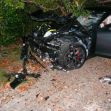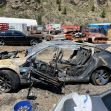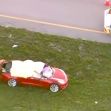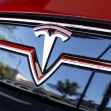A federal jury in Miami has found Tesla partially liable in a fatal crash involving its Autopilot system, ordering the company to pay $329 million in a wrongful death and personal injury lawsuit. The verdict follows a trial over the 2019 collision in Key Largo, Florida, which resulted in the death of Naibel Benavides Leon and left Dillon Angulo with serious injuries.
Jurors awarded $129 million in compensatory damages and $200 million in punitive damages to Benavides Leon’s estate and Angulo. This is the first time Tesla has been found liable at trial for a third-party death linked to its driver-assistance technology.
The collision occurred on April 25, 2019, when George McGee drove a Tesla Model S through a stop sign and traffic light before crashing into a parked Chevrolet Tahoe. The victims were standing beside the SUV when it was struck. Benavides Leon, 22, was pronounced dead at the scene. Her body was found approximately 75 feet from the crash site. Angulo, her then-boyfriend, sustained severe injuries.
McGee had reportedly activated Autopilot prior to the crash but became distracted while reaching for his phone. At trial, plaintiffs argued that Tesla’s system failed to alert or intervene as the vehicle entered the intersection. They also claimed the company promoted the technology as more capable than it was in practice and failed to limit its use to appropriate road conditions.
Tesla’s legal team contended the crash resulted from driver error and stated that McGee had pressed the accelerator, overriding Autopilot. The company maintained that the system requires drivers to remain fully attentive and prepared to take control at all times.
The plaintiffs cited Tesla’s promotional materials, including a 2016 video that appeared to show a vehicle driving without human input. In prior testimony unrelated to this case, a senior Tesla engineer acknowledged that the video was staged and did not accurately reflect the software’s functionality. Attorneys for the victims argued that such marketing created confusion about the system’s true capabilities and encouraged misuse.
The lawsuit was allowed to proceed to trial after U.S. District Judge Beth Bloom denied Tesla’s motion to dismiss. The judge concluded that a jury could reasonably find the company acted with disregard for safety by enabling Autopilot use in situations where it was not intended to operate.
Tesla, headquartered in Texas, has indicated it plans to appeal. The company has not released a public statement in response to the verdict.






